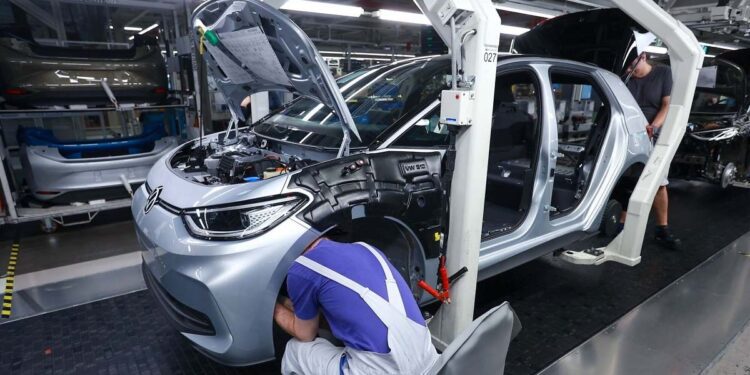The war between the West and China for global dominance in the automotive sector opens a new chapter with the threat hinted by Beijing in recent hours. After the United States’ decision a few days ago to apply a 100% tariff on the import price of Chinese electric cars and as the European Union’s investigation into Beijing’s subsidies to its national manufacturers to compete more forcefully globally draws to a close, China has indicated tariffs of up to 25% on imported cars with large displacement engines.
The China Chamber of Commerce to the EU claims to have been informed about the possible measure by “people with insider information,” according to a statement published in X. The duties would affect European and American car manufacturers and have a “significant” impact on relations with the EU, adds the lobby in Brussels. The Chinese chamber, as reported by Bloomberg, refers to an interview published on Tuesday in the Global Times newspaper, the official newspaper of the ruling Communist Party, in which Liu Bin, chief expert of China’s Automobile Research and Technology Center, called for temporarily increasing the tariff rate on cars with engines larger than 2.5 liters. In short, another turn of the screw in the midst of the escalating trade tensions between China, the US, and the EU.
The truth is that Beijing is intensifying its threats of retaliation as the deadline approaches for the EU to announce the results of its investigation into Chinese subsidies for electric vehicles. The block must inform Chinese exporters of its intent to impose tariffs in early June, which could take effect a month later, according to Eurasia Group.
Trade tensions between the EU and China have escalated since the investigation into electric vehicles was announced, and President Xi Jinping’s visit to Europe this month does not appear to have helped ease the tension. Xi sought to dissuade the bloc from following the same path as the US, which has imposed a wide range of tariffs on imports from China, raising concerns in Beijing that US allies will follow suit.
“China’s trade investigations and warnings are not dissuading the EU,” wrote Eurasia Group analysts in a note on Tuesday. “Brussels is eager to send a strong signal to Beijing with its investigation into electric cars that the EU will counter Chinese subsidies and overcapacity.” Sector analysts estimate that Brussels could opt for a tariff that goes from the current 15% to 30%. However, experts like those at the Rhodium Group calculate that tariffs of around 40%-50% would be needed for Europe to curb what is already being called the ‘invasion’ of Chinese electric cars.
China imported 250,000 cars in that category last year, and World Trade Organization rules would allow a tariff of up to 25%, according to the report cited by Liu. The most affected European car manufacturers would be the Germans, with Mercedes-Benz and BMW in focus, as detailed to Bloomberg by Daniel Kollar, director of the automotive and mobility department at the consulting firm Intralink.
Other German brands would also suffer: most of the Chinese car imports belong to the luxury segment, with the also German Porsche and Audi and the British Range Rover among the top 10 brands in 2023. Models with larger engines, such as Mercedes’ GLE SUV and S-Class sedan, and Porsche’s Cayenne SUV, could be affected if the new tariff is applied. Shares of European car manufacturers that could be most affected by a possible tariff are dropping in the stock market on Wednesday. German companies BMW, Porsche, and Mercedes-Benz are recording declines between 1.5% and 2.5%. Volkswagen is also down more than 1%.
Japanese firm Toyota would be another major casualty. Toyota’s Lexus brand led the overall import ranking last year with 180,000 sales, more than a fifth of the total. If Beijing decides to apply the tariff to all countries, the Japanese company could become collateral damage in the trade dispute with the EU and the US.
In addition to the attack on the automotive trade, China has recently hinted that it could impose tariffs on European wines and dairy products, and has launched an investigation into European exports of brandy. Amid global concern over the rise in Chinese exports, the electric vehicle sector is under special scrutiny. China produces more electric cars than any other country and controls most of the battery supply chain. Faced with price wars and a slowdown in the national economy, its car manufacturers are looking to expand overseas. Last year, they exported 1.55 million electric vehicles, 40% of them to Europe.
Nothing is confirmed by Beijing’s official channels, but warnings are being issued. The spokesman for the Chinese Ministry of Foreign Affairs, Wang Wenbin, was asked about the car conflict with Europe at a press briefing held on Wednesday in Beijing. “We have taken note of the relevant statements by the European side and hope that they will fulfill their commitments to support free trade and oppose protectionism,” he said.


